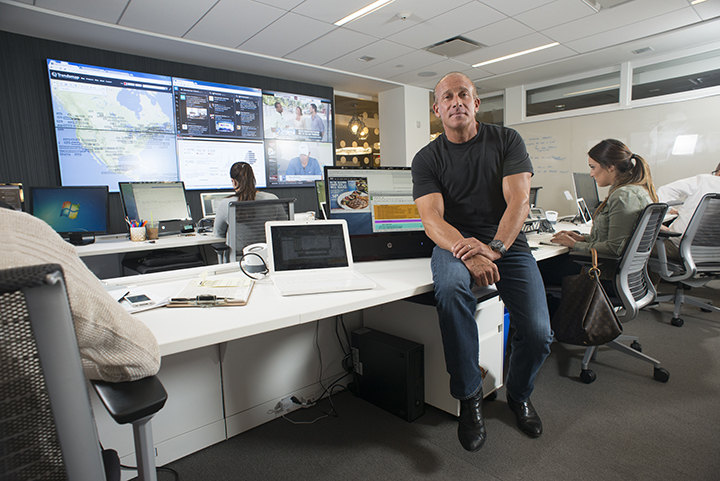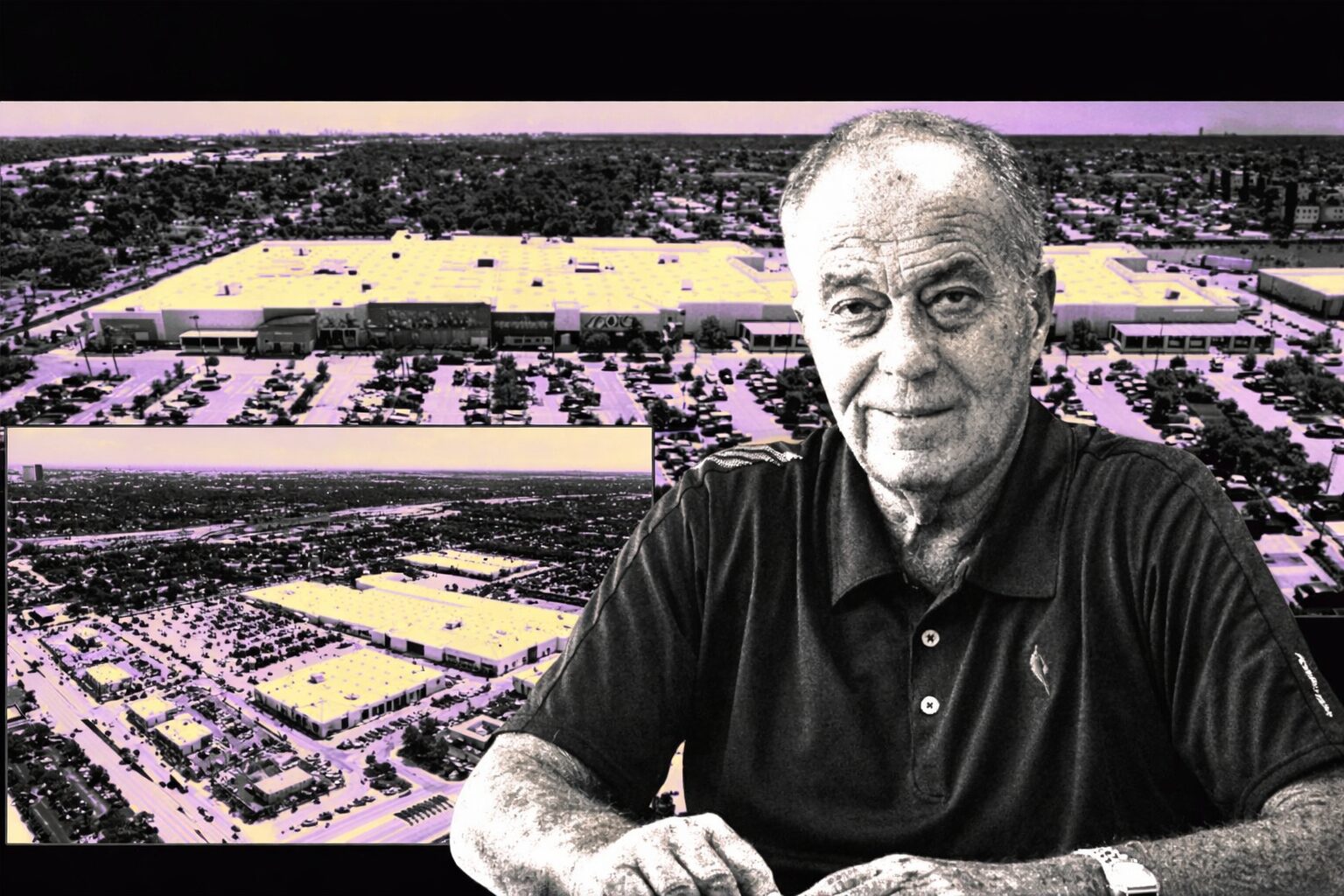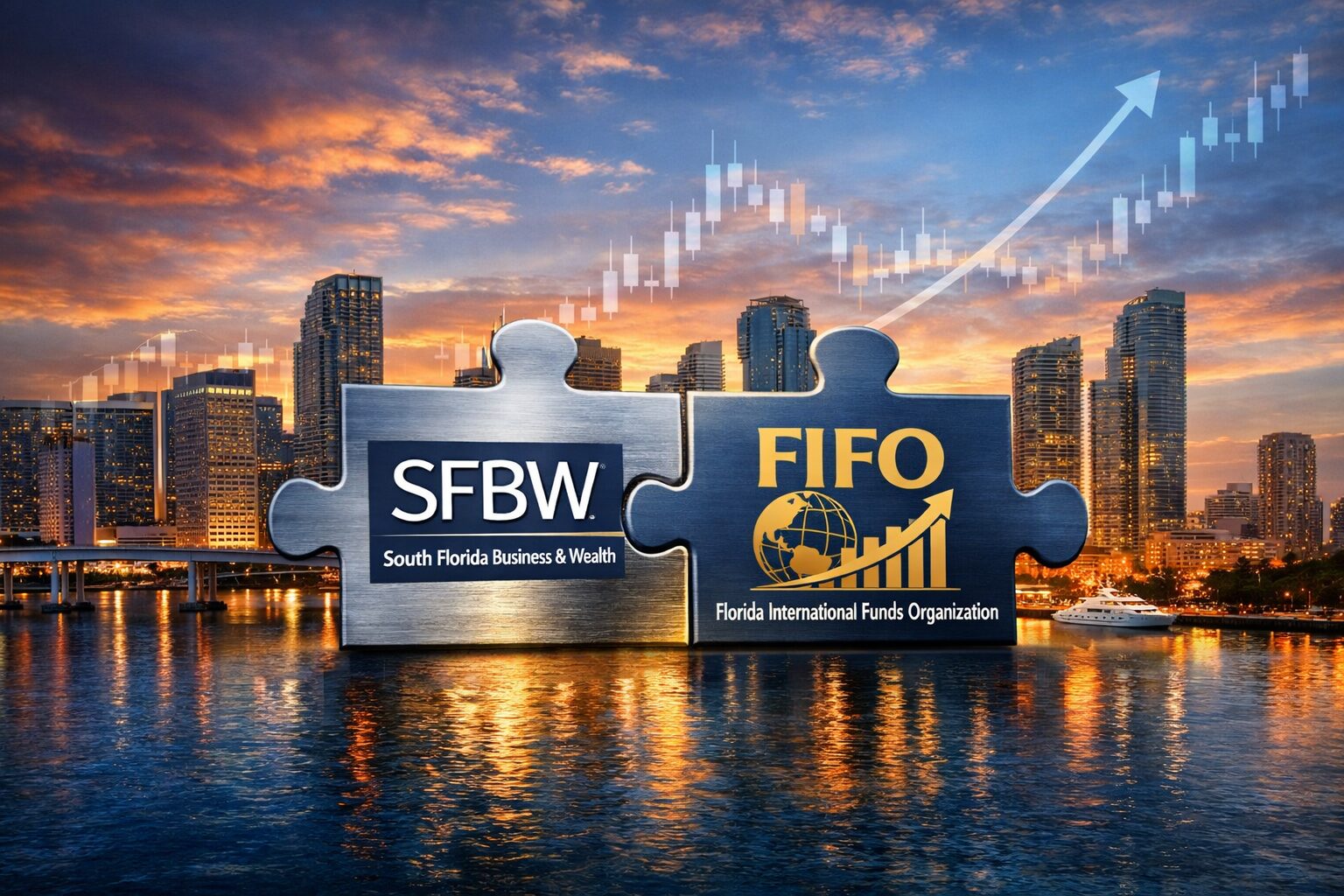Jordan Zimmerman is perched atop the advertising world in South Florida with a No. 1 ranked agency that reports more than $3 billion in client media purchases annually. Zimmerman is celebrating 30 years in the industry with a new 130,000-square-foot headquarters along I-95 near Cypress Creek Road and a new book, “Leading Fearlessly.”
The following interview has been edited for brevity, continuity and clarity.
You call yourself insane in your book – how do people react to that?
I think anything else is just normal if you compare it with some of the people in the world who have thought out of the box and the greatness they have. I think it’s good to look at things a little different, which I call insanity.
When do you start plugging in to work in the morning?
I get my client numbers after 12 a.m., and then I think about them if I’m up. They are either thought-provoking or rewarding. I look at all the numbers for my clients every day. By 6 a.m. I know them.

What metrics do you look at?
I look at comparison sales. Did they comp over last year and how much. I look at the number of transactions or whether we are doing it with bigger tickets. I look at average baskets and if we are running a promotion, what else are they coming out with.
How do you analyze and react to it?
Every client has a plan. The question is: Are we ahead of plan for the day or are we behind? If we’re behind, I look at the share of voice and having the right media mix. I start to analyze and rethink. I look at the messaging. I look at the direct competition. I look at their voice and the offers they have in the marketplace.
I look at whether we are giving the consumer a better reason to buy beyond price and if we are using consumer insights to determine what the consumer is looking for in our messaging. And I look at if we are delivering on those insights. We plan for tomorrow and we react to today.
I’ve been listening to the quarterly reports on retailers on CNBC and there have been some major misses.
What’s wrong?
I think retailers look at the numbers, but may not dissect numbers the way my team dissects numbers. There are no other agencies like Zimmerman that really dissect the numbers of their clients on a daily basis and live and die on those numbers.
For us it’s not about the output of the work, it’s about the outcome of the work. For us there are no surprises for our clients or Wall Street. Our clients are always, always, always ahead of the curve and are making the proper adjustments to drive their business every single day.
How often do you personally reach out to clients?

I talk to our clients, the CEO, presidents, founders and chairmen almost everyday. I’m either talking to them, texting them or emailing them.
I want to talk some more about your book. How do you go from something being a chore to a habit to a passion?
Let’s go back to school. They teach you, but there is no relevancy or application. In the real world, everything is coming at you so quickly you have to learn to dissect it and it has to become second nature to you. That’s exactly what I’ve done.
When I started working it was like a chore every day. You took things and made them into a habit every day. Then you realized when you made it a habit and consistent your passion would come through. You would become an expert on how it worked and apply that passion every single day.
You write about fighting negative thoughts. After all your success, do you still have to quiet fears and negative thinking?
Fear and negativity enter everyone’s mind. You fear you might lose a piece of business. You have to use that. Out of the darkest days come the brightest lights if you persevere.
In 1997, we lost Mitsubishi. There was a new president and it represented 30 to 40 percent of our business. I had fear, so I had to eliminate that fear from my mind and put a plan together to replace that business as fast as I possibly could.
So, over the next 6 months Ireplaced that business with other businesses and a year later I won the Nissan business for the United States.
I wrote to my son when he was graduating from college and I quoted Steve Jobs from a Stanford University speech. He said, “Stay foolish. Stay hungry.” I said to my son, “Add a third. Stay desperate.” You can never ever be satisfied with your accomplishments or your clients” accomplishments. Our mission at Zimmerman is to relentlessly pursue the client’s goal and never rest in the glory.

What does it mean to be foolish?
I think what he meant by foolish was to think different and to be different. Allow yourself to think outside the box and let people think it’s foolish. When Jobs created the iTunes and the iPod nobody said it would work when you could steal music off the Internet. Not only did it work, it put all the music retailers out of business.
If I listened my whole life to people who said what I couldn’t do, I wouldn’t be sitting in front of you today.
Why do people just talk about goals and not do anything about them?
In 1997, we lost Mitsubishi. There was a new president and it represented 30 to 40 percent of our business. I had fear, so I had to eliminate that fear from my mind and put a plan together to replace that business as fast as I possibly could.
So, over the next six months I replaced that business with other businesses and a year later I won the Nissan business for the United States.
I wrote to my son when he was graduating from college and I quoted Steve Jobs from a Stanford University speech. He said, “Stay foolish. Stay hungry.” I said to my son, “Add a third. Stay desperate.” You can never ever be satisfied with your accomplishments or your clients” accomplishments. Our mission at Zimmerman is to relentlessly pursue the client’s goal and never rest in the glory.

What does it mean to be foolish?
I think what he meant by foolish was to think different and to be different. Allow yourself to think outside the box and let people think it’s foolish. When Jobs created iTunes and the iPod, nobody said it would work when you could steal music off the Internet. Not only did it work, it put all the music retailers out of business.
If I listened my whole life to people who said what I couldn’t do, I wouldn’t be sitting in front of you today.
Why do people just talk about goals and not do anything about them?
The first reason is they don’t write them down. They don’t have a business plan to achieve their goals. They never wrote about it, thought about, or did a SWOT [strengths, weaknesses, opportunities and threats] analysis.
If you want to accomplish a goal, write it down and then work it, work it, work it.
Who is your biggest hero in business these days?
Steve Jobs for getting fired. He came back, built the brand, and changed the brand from Apple Computer to Apple. He was an innovator. Today, Apple rules the world.
Talk about avoiding short-term thinking – the unwillingness to do without now and sacrificing for a longer-term goal.
It’s so important. I lived in the back room of my parent’s home on a sleeper sofa for six years because I didn’t want to give up my dream. I started my company at the beginning of the tech revolution when technology was very expensive. Any time I made any money, I was either hiring somebody or investing in technology. So, at the end of the year there wasn’t anything left for me.
How often do you use IDFC ” “I don’t effing care” – in regards to excuses and do you actually say effing or something more profane?
I really don’t give a f—. At the end of the day, I don’t f—ing care. I want to do what’s right and make the right decision for the company, what’s best for clients and employees. I want to make the right decision for the community. I want to take the success I have and give back to the community.
You had a social media campaign, “Meet Jordan Zimmerman,” about spending a day with you. How did that go? Was there a winner?
We had somebody from the 3M Co., their executive creative director, talk 3M into posting my campaign on Times Square for five hours on a digital billboard. The winner was John Hricik III. He’s a great guy. John actually works here now. He’s a junior account executive in automotive.
What was your reaction to the Advertising Age story about your campaign? The article was sort of snarky and compared your promotional video to an Onion parody.
I’ve said my whole life that I don’t live my personal life or business life on what people say. I believed in my heart of hearts that it’s the right thing to do. The idea was I would meet with someone and help them accomplish their dreams.
Our industry looks at us and doesn’t understand the business today is about metrics.
I might be the bad boy of the industry.
What are some of your philanthropic endeavors?
At the University of South Florida, there’s the Zimmerman Advertising School. We have the best advertising curriculum in the country today bar none.
When I got there 12 percent of the students in advertising graduated. Today it’s 82 percent. That only happens when they are trained properly and are in high demand. Our goal is to get to 90 percent.
We also do a huge internship program at Zimmerman. We bring in 30 interns from around the country. We get over 600 applications. I hear, “I have learned more in your program in the last 12 weeks than I have learned in my entire schooling life.” That is satisfying and rewarding.
I built the gym for Pinecrest School in Boca Raton. It’s called the Zimmerman Family Athletic complex.
When I came here my senior year of high school, I went to a school called Piper [in Sunrise]. I adopted Piper five or six years ago. I walked through the school and was horrified. The principal at the time, Enid Valdez, and I formed a partnership and I built a TV and radio studio – state of the art. I helped them with advancing their curriculum. We took them from a “C” school to an “A” school.
Reviews on Glassdoor gives Zimmerman a 3.6 rating out of 5 – some people rave about your agency and others complain that they don’t have free time, the pay is low and people are leaving. How do you view this?
Our turnover rate is the lowest in the industry. It’s under 15 percent now. The industry rate is at 30 percent.
You can’t make everyone happy. It’s called work for a reason. We’re not made for everyone. Some people are going to leave and say you expect too much, but my clients expect that. If you look at their statements, advertising is their second biggest expense.
Glassdoor also says 72 percent like you as a CEO. Why?
They probably respect my leadership. They respect the vision of being able to give them an incredible workplace. They respect that I make the hard decisions when other people won’t. They respect that I’m working with clients every day and looking for new business every day. Most importantly, they realize I care about each and every one of them and I want them to succeed.
How do you best tell a client something they don’t want to hear?
I think our clients hire us because of our experience, our case studies and the success we’ve obtained. They want expertise. I believe a client needs to know the truth respectfully. You will never hear me say to a client or someone at Zimmerman that something is stupid or a bad idea.
We will have tough conversations that need to be had and that’s what they are paying us for.
What are the most important marketing trends these days that businesses need to pay more attention to?
I think being able to socially connect to their potential customers and their existing customers. Being able to truly understand that being a brand means you have the responsibility to evolutionize that brand every day – not be stagnant and set in your ways.
Tell us about your social media room, which looks like Mission Control.
I had a vision one night after watching the Boston Police Department announce the arrest of the bombers. My vision was that news was now going to be reported through the social sphere because they read the capture off a Twitter post.
The “a-ha” moment was that we could use this to broadcast our brand on a local, regional, national and international level.
I wanted to build the first social media newsroom of this kind. One of my clients, Dennis May, the CEO of hhgregg, says, “You have leapfrogged the world with your social media newsroom and what you are doing today.”
The social media newsroom connects all of my clients” brands with the consumer, whether they are a customer or not, in meaningful ways. Those brands are now positioned while at the same time activating their sales channels. They are collaborating with people that shop those brands, potentially could shop those brands and are loyal customers.
What fun stuff do you have around Zimmerman?
Everything is glass, so the light comes through to spawn energy. One of my partners who just passed on, Zev Auberach, would talk about light being energy.
There is also a huge game room for associates to take breaks in and play. There’s a huge lunchroom with free coffee and a Coca-Cola Freestyle machine with 144 different flavors. At the corner of every floor is a small coffee room with a copier and a fridge for people to put their lunch.
Who is your biggest client?
Today it would probably be Nissan North America.
What makes you angry?
I don’t think I get angry anymore. I get disappointed and frustrated. I learned the responsibility of a true leader is to be a good coach and to support the people that need your support. Sometimes you have to instill tough love, but the true great leaders understand no two people are managed the same – everyone deserves the opportunity to create greatness in their life.
What makes you smile?
When I’m home it’s my family. Walking into this building makes me smile and seeing happy employees makes me smile. Having happy and successful clients makes me smile. Being healthy makes me smile.?
A few of the accolades for Jordan Zimmerman
1991: University of South Florida (USF) Entrepreneur of the year
2007: USF Distinguished Alumnus Award
2008 Entrepreneur Hall of Fame Award from the H. Wayne Huizenga School of Business and Entrepreneurship, Nova Southeastern University
2012: Ernst & Young Entrepreneur of The Year in the Corporate Innovator Category. Greater Fort Lauderdale Alliance CEO Council Econonomic Development Leadership Award
2013: FAU Business Leader of the Year Award
The TV show
Jordan Zimmerman and Spike TV are teaming up on “Passing the Buck.” Zimmerman will use his expertise to help small family businesses make major decisions. Expect it in early 2015.
Zimmerman Advertising clients
AutoNation
Party City
Nissan
Extended Stay
Lennar
Five Below
Kanes
Atlantis
ADT
Dunkin Donuts
Boston Market Lucky Brands
Ashley Furniture
hhgregg
Papa John’s
Firehouse Subs
Logan’s
CBS
AC Moore
Consolidated Credit
Office Depot
Tire Kingdom
White Castle














